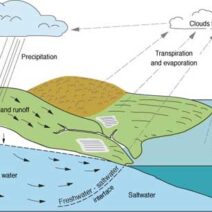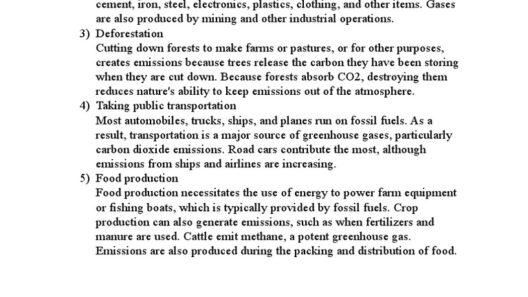Global warming has become a pressing issue affecting every aspect of life on Earth. The rise in average global temperatures poses significant threats to ecosystems, weather patterns, and human health. Addressing this crisis requires a multi-faceted approach, incorporating personal responsibility, government action, and corporate accountability. Let’s delve into strategies for a sustainable future and explore how individuals and communities can unite to combat this global challenge.
Understanding the Causes of Global Warming
Before implementing preventative strategies, it is essential to comprehend the underlying causes of global warming. Greenhouse gases, primarily carbon dioxide (CO2) and methane (CH4), are emitted through human activities such as burning fossil fuels, deforestation, and industrial processes. The accumulation of these gases in the atmosphere traps heat, leading to the greenhouse effect. Consequently, understanding these mechanisms is integral to developing effective mitigation policies.
The Role of Renewable Energy
Transitioning from fossil fuels to renewable energy sources is crucial in reducing greenhouse gas emissions. Solar, wind, hydroelectric, and geothermal energy are abundant and sustainable alternatives that can power our homes, businesses, and industries while drastically reducing our carbon footprint.
Investing in solar energy technology has advanced significantly, making it more accessible and affordable for households. Utilizing rooftop solar panels can significantly decrease dependence on fossil fuels, leading to lower utility bills and a reduced environmental impact.
Wind energy, often generated in vast wind farms, represents another potent strategy. By harnessing the natural power of the wind, we can generate electricity without depleting resources or emitting greenhouse gases. Community-based wind power projects empower local populations and ensure a cleaner energy future.
Hydroelectric energy has historically been a leading source of renewable power; however, it requires careful management to minimize ecological disruption. With effective planning, it can serve as a robust energy resource while preserving aquatic ecosystems.
By advocating for diverse renewable energy infrastructures and prioritizing public funding for these technologies, we show commitment to a sustainable future.
Promoting Energy Efficiency
In addition to transitioning to renewable energy, enhancing energy efficiency is paramount. Implementing energy-efficient appliances and systems can significantly reduce energy consumption in homes and businesses. This includes upgrading insulation, using smart thermostats, and opting for LED lighting to curtail energy waste.
Urban planning also plays a critical role in energy efficiency. Designing cities with accessible public transportation systems mitigates reliance on individual vehicles—reducing carbon emissions and fostering a more sustainable way of life. Promoting walkable neighborhoods encourages physical activity and contributes to improved air quality.
Embracing Sustainable Agriculture
The agricultural sector is both a contributor to global warming and a victim of its consequences. Sustainable agricultural practices can play a dual role in addressing climate change. Techniques such as crop rotation, agroforestry, and permaculture improve soil health and promote biodiversity while sequestering carbon. Additionally, reducing food waste through better supply chain management and consumer awareness is paramount. Approximately one-third of food produced globally is wasted, which translates directly into wasted resources and emissions.
Supporting local, organic farming initiatives can further mitigate the impacts of global warming. These practices often emphasize the importance of eco-friendly techniques, which minimize chemical fertilizers and pesticides, thus protecting both the environment and public health.
Encouraging Behavioral Change
Individual actions collectively contribute to global change. Behavioral modifications, such as reducing meat consumption, utilizing public transport, and increasing recycling efforts, are critical components of combating global warming. Adopting a plant-based diet can substantially lower one’s carbon footprint, as meat production is resource-intensive and contributes significantly to greenhouse gas emissions.
Educating communities about the importance of sustainability fosters a culture of environmental stewardship. Campaigns centered on reducing plastic use, conserving water, and understanding carbon footprints empower individuals to take actionable steps towards climate consciousness.
The Role of Policy and Legislation
While grassroots efforts are essential, systemic change is imperative. Governments worldwide must implement policies that enforce stringent emissions regulations and incentivize sustainable technologies. Frameworks such as carbon pricing can impose a cost on emissions, encouraging companies to reduce their carbon footprint.
International cooperation is also vital. Global agreements, such as the Paris Agreement, aim to unite nations in pursuit of climate goals. By collaborating across borders, countries can share best practices, technologies, and resources to tackle global warming on a larger scale.
The Corporate Responsibility Paradigm
Corporations bear a significant responsibility in combatting climate change. Major industries, particularly those reliant on fossil fuels, must transition towards sustainability by adopting green practices and reducing waste. Implementing circular economy models—where resources are reused, repaired, and regenerated—can drastically impact emissions.
Additionally, corporations can invest in carbon-neutral initiatives and support community development projects focused on sustainability. Transparency in emissions reporting further holds companies accountable, ensuring they adhere to commitments made towards reducing their carbon footprints.
Conclusion: A Collective Endeavor
Preventing global warming demands cooperation across all sectors of society, calling for changes in personal habits, corporate practices, and governmental policies. As individuals, we can make a difference in our daily lives while advocating for systemic change. Through the adoption of renewable energy, improved efficiency, sustainable practices, and support for legislation aimed at reducing carbon emissions, we can create a sustainable future for generations to come. It is not merely an option; it is an obligation for the preservation of our planet and all living beings. The clock is ticking, and the responsibility rests with us all.






